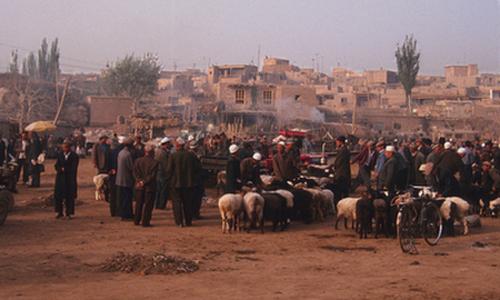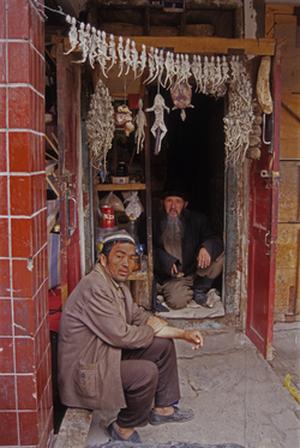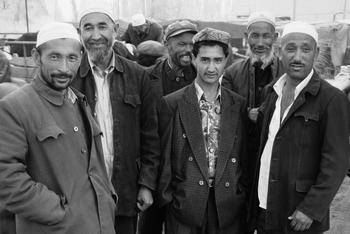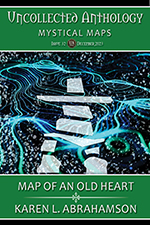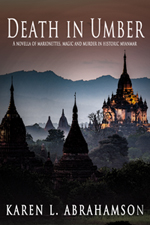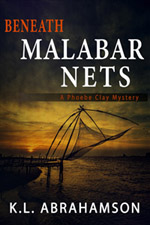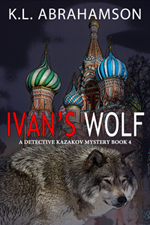Voice: Kitchen Cupboards, Gleaming Mountains, and a Peeled Pommelo
For all that Ben and Shiva are full brothers, they are very different cats with very different voices. Shiva, though much smaller, has the loud Siamese yowl that can shatter sleep like a siren. He’s a skitter-bug cat that loves to play and will make a toy out of anything he can get his little Velcro paws on. His favorite playtime is diving under the pillows on my bed and waiting, like a jaguar, for something to move so he can attack. He also likes to sit on top of the kitchen cupboards peering down like a vulture.

Ben, on the other hand, is much quieter, with mews more like muttering to himself, but there are dark waters swirling in that cat. This week the challenge has been that he has figured out how to open upper kitchen cupboards – in particular the one above the fridge that holds the wine glasses (maybe he’s developed a taste for the vino?). He’ll throw anything off the fridge that I put up to block him. The scary thing is I actually know when he figured out how to do it. I saw him watching me as I was getting something out of the cupboard and the spark of idea absolutely flashed in his eyes.
While both of these cats have watched me open cupboards numerous times, both of them (and me) come from different perspectives. Shiva comes from the perspective of “that’s interesting that she can do that”, while Ben comes from the place of “If she can do that, so can I – and no one can stop me”. One comes from the place of a gentle, clowning soul, while the other is just, well, evil? Me, I just want my wine glasses safe in the cupboards, all of which illustrates the underlying concept of character voice – different perspectives regarding our environment.
This is different from a writer’s voice. A writer’s voice comes through as style. A writer’s style may grow and change, but you can tell a Stephen King no matter when he wrote it, or under what name. Same goes for a James Lee Burke. There’s a certain attention to detail that comes through no matter what he writes.
But character voice can be the bane of new writers. What is it? How does it work? What’s all the fuss about when I can write a beautiful descriptive scene, or a terrific action sequence?
Character voice ilustrates the different world view each character possesses, just as Ben and Shiva and I each have different perspectives about my kitchen cupboards. I’ll share with you two different stories from my travels that illustrate how two people can live through exactly the same thing and have totally different experiences.
I lived in Thailand for a while and while I was there I travelled around with a wonderful Thai friend named Nin. Now, one of my favorite Thai delights was the large citrus fruit called pommelo. For anyone who hasn’t tried them, they are like a grapefruit only much larger, drier, and sweeter, and their rind is about an inch thick. As a result they are delicious, but incredibly labor intensive to peel.
So Nin and I were driving with her fiancée and we stopped and bought a pommelo and she began to peel it for me. Not that I was in any way incapable of peeling the darn thing myself. She not only peeled the rind, she then carefully performed delicate surgery on each segment to release the luscious flesh from its skin. Then she passed each delicious piece to me or her husband-to-be.
Now that I think back on it, it was one of the most beautiful examples of the Thai ethic of total focus on performing each action perfectly in order to provide pleasure to others. At the time, however, I was embarrassed. I thought she didn’t think I was capable of peeling a pommelo, and I felt uncomfortable having her serve me when I could have peeling the fruit myself. Yet to Nin this was just being the lovely woman that she was, and gifting a friend with something she loved. Two different people experiencing the same thing, but coming from different cultures, our understanding of the event meant something dramatically different.
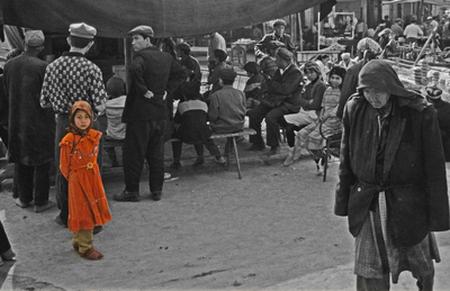
The other example took place along the Silk Road in western China. My friend and I were smashed side by side on an interminable bus ride across the Taklamakan desert and far in the distance across an eternally flat land, I saw a bluff gleaming in the low angled sunlight. I watched it change iridescent pinks, blues and mauves as the light fell in the late afternoon, so I hauled out my notebook and waxed on and on about the wonder of beauty in the midst of all that desolation. When I finished with my eloquence, I turned to my friend, a fellow Canuck and mathematician, and pointed out the mountain and prepared to launch into my ode to beauty. What did she say when I pointed out the mountain?
“Sure. It’s chalk.”
A perfect example of how different our minds worked. And that’s character voice. While I waxed poetry in my journal she was busy examining the visual data to determine the geological makeup of that mountain. The jar of the dissonance in our experiences shut me down – until I burst out laughing.
If only I could shut Ben down so easily.
